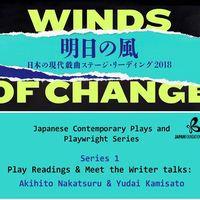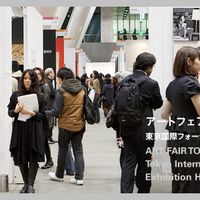Berlinale 2012 Diary: 12 Asian films vie for the Forum/NETPAC Award
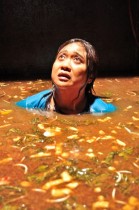 The 42nd edition of the Berlinale Forum includes twelve films from the Asian/ASEAN region competing for the Forum/NETPAC (Network for the Promotion of Asian Cinema) Award.
The 42nd edition of the Berlinale Forum includes twelve films from the Asian/ASEAN region competing for the Forum/NETPAC (Network for the Promotion of Asian Cinema) Award.They include Al Juma Al Akheira (The Last Friday) by Yahya Alabdallah (Jordan/UAE), Ang Babae sa Septic Tank (The Woman in the Septic Tank) by Marlon N. Rivera (Philippines), Bagrut Lochamim (Soldier / Citizen) by Silvina Landsmann (Israel), friends after 3.11 by Iwai Shunji (Japan), Kashi (Choked) by Kim Joong-hyun (South Korea), Kazoku no kuni (Our Homeland) by Yang Yonghi (Japan), Koi ni itaru yamai (The End of Puberty) by Kimura Shoko (Japan), No Man's Zone (Mujin chitai) by Fujiwara Toshi (Japan/France), Nuclear Nation by Funahashi Atsushi (Japan), Paziraie Sadeh (Modest Reception) by Mani Haghighi (Iran), Le sommeil d'or (Golden Slumbers) by Davy Chou (Cambodia/France), and Tepenin Ardı (Beyond the Hill) by Emin Alper (Turkey/Greece).
Al Juma Al Akheira (The Last Friday)
Since gambling away everything he used to own, Yousef has lived alone in humble conditions, working as a taxi driver. In order to scrape together the money for an upcoming operation at the hospital, he turns to his boss for help and re-establishes contact with his son and now wealthy ex-wife after a long period of estrangement. Much is therefore in motion on the eve of the surgical procedure.
As far as their film school final project is concerned, these three students have only one goal in mind – international fame, including Oscars and festival prizes. They know what foreign audiences expect from Philippine cinema – prostitution, abuse, rubbish tips and slums – and apply this magic formula to develop the ultimate in misery porn. A mother, battered by life, sells her child to a sex tourist; a story as harsh and realistic as it is rousingly emotional. The only thing missing is a big-name star, but famous actresses can be such divas …
Bagrut Lochamim (Soldier / Citizen)
Towards the end of their military service, young Israelis are given another chance to obtain a school-leaving certificate if they don’t have it already. For three consecutive weeks, civic education is the order of the day. In uniform and with their guns always within reach, the students discuss pluralism, discrimination, human rights, the complex definition of the Jewish State and the Israeli-Palestinian conflict.
friends after 3.11
Friendships are forged through crisis. Iwai Shunji gathered together those that had become important to him after the tsunami of 11 March 2011 and held long discussions with them. Their controversial conversations revolve around science and politics, self-interest and altruism, money and responsibility and renouncing atomic power. We thus meet a young activist in her school uniform, speak to Malaysian director Tan Chui Mui via Skype and learn that the same number of people commit suicide in Japan as run the Tokyo marathon.
Kashi (Choked)
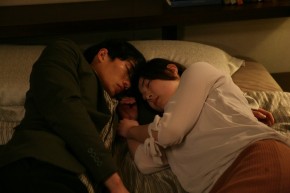 A few years ago, Youn-ho's mother disappeared with the family’s money. He’s now trying to forge a new life with his girlfriend but more and more of his mother’s creditors keep knocking at the door.
A few years ago, Youn-ho's mother disappeared with the family’s money. He’s now trying to forge a new life with his girlfriend but more and more of his mother’s creditors keep knocking at the door.Youn-ho's girlfriend wants a car and a big flat as an engagement present, whereas his neighbour wants her part of the money back that she lent his mother for dubious investments. For her part, Youn-ho's aunt thinks that her generosity is being exploited. In order to relieve the financial pressure, Youn-ho is forced to enter into a series of shady deals.
Kazoku no kuni (Our Homeland)
From the late 50s and into the 70s, more than 90,000 of the Koreans resident in Japan emigrated to North Korea, a country that promised them affluence, justice and an end to discrimination. KAZOKU NO KUNI tells the story of one of their number, who returns for just a short period. For the first time in 25 years, Sonho is reunited with his family in Tokyo after being allowed to undergo an operation there.
Koi ni itaru yamai (The End of Puberty)
Schoolgirl Tsubara is oddly obsessed with her awkward biology teacher Madoka. While the rest of the class responds to their instructor’s lack of authority with clamour and inattention, she hangs on his every word, filling her notebook with sketches and observations to record his quirks and peculiarities. One day, she finally takes the plunge and pounces on Madoka in his office, which results in the two of them inexplicably exchanging their sexual organs. They head to the country to hide, but are soon discovered by two of Tsubara’s schoolmates: En, who is secretly in love with her, followed by En’s own persistent admirer Maru.
No Man's Zone (Mujin chitai)
A man wanders through the 20-kilometre exclusion zone around the stricken nuclear reactors at Fukushima. The cherry trees are in bloom and the natural surroundings make an idyllic impression. Radiation is invisible, yet a gaping emptiness looms where the tsunami engulfed streets and houses. The man is wearing normal clothing, just like the people still toughing it out here, for the time being at least. He occasionally encounters white “ghosts” in protective clothing, performing strange tasks.
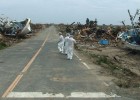 Nuclear Nation
Nuclear NationOn 11th March 2011, the tsunami sealed the fate of the town of Futaba in the Japanese prefecture of Fukushima. A large part of the town was swallowed up by the sea. The following day, nuclear fallout from the Fukushima Daiichi atomic power station three kilometres away reached what still remained of it.
Paziraie Sadeh (Modest Reception)
A man with his arm in a cast who thus resembles Napoleon and a well-dressed woman are making their way through a war-torn mountainous region in an SUV. The boot of the car contains plastic bags filled with money to distribute to the needy people they encounter on their journey. But are the two of them really on a charitable mission or are we watching a duplicitous game of temptation and morality?
Le sommeil d'or (Golden Slumbers)
A nocturnal drive along a rural highway into a city at dawn that is somehow moving in the wrong direction. It is only after a while that you notice that the vehicles are travelling backwards, receding back into the dusk of reality. This mysterious metaphor forms the starting point for a journey into the unknown history of Cambodian film. Nearly 400 films were made in Phnom Penh between 1960 and 1975, only 30 of which survive today. The Khmer Rouge burnt them or allowed them to decay along with many of the country’s studios and cinemas. Most of those involved in the film industry became victims of the genocide.
Tepenin Ardı (Beyond the Hill)
 It’s a summer’s day and retired forester Faik is receiving visitors at his country home. His son Nusret has come to visit with Faik’s two grandsons Caner and Zafer. Despite the summer setting however, the mood remains oddly muted. Faik is having problems with the local nomads and is constantly on his guard, while Zafer has been suffering mental problems since his military service. This small group is completed by the family of Mehmet and Meryem and brings together different temperaments and social classes. But conflicts are avoided: it’s all someone else’s fault, that of the nomads, who remain an invisible foe.
It’s a summer’s day and retired forester Faik is receiving visitors at his country home. His son Nusret has come to visit with Faik’s two grandsons Caner and Zafer. Despite the summer setting however, the mood remains oddly muted. Faik is having problems with the local nomads and is constantly on his guard, while Zafer has been suffering mental problems since his military service. This small group is completed by the family of Mehmet and Meryem and brings together different temperaments and social classes. But conflicts are avoided: it’s all someone else’s fault, that of the nomads, who remain an invisible foe.(from the site)
Similar content
By Kerrine Goh
19 Jan 2012
22 Aug 2012
from - to
07 Sep 2018 - 27 Sep 2018
posted on
12 Feb 2012
posted on
20 Mar 2012
from - to
29 Jul 2011 - 31 Jul 2011



